| In This Issue: NCGT Local Food Supply Chain Apprentices |
| Kristen Wagner, NC Catch |
| Molly Riddle, TRACTOR |
| Shannon Herlihy, TRACTOR |
| Ben Herndon, Foster-Caviness |
| Katelyn Bailey, Small Business and Technology Development Center, UNC Pembroke |
| Casey Auch, Feast Down East |
| Chase McCurry, Onslow County Cooperative Extension |
| Kate Ford, Polk County Agricultural Economic Development Center |
| Maria Vollmer, FreshPoint |
| About the NCGT Local Food Supply Chain Apprenticeship |
|
|
NCGT's Local Food Supply Chain Apprenticeship is an 8-week summer program that offers apprentices the opportunity to work with local food hubs, businesses and organizations and gain hands-on training related to local food systems and value chains work.
This is the third year of the Apprenticeship program. You can learn about the 2015
Apprentices here, and about the 2016 Apprentices here.
|
| Learn More |
|
 Article Subheading
Article Subheading
|
| Upcoming Events |
|
|
Article Subheading
Good Agricultural Practices (GAP): Navigating the USDA GAP Audit One-Day Workshops
September 7, 2017 Wake County, NC
For more information about the Food and Farm Business Development Webinar Series, please visit the NCGT website.
----------------------------
Grower-Buyer Meet-Up at CFSA's Sustainable Agriculture Conference
Join CFSA and NCGT for an opportunity to connect growers with buyers who are interested in sourcing local foods. The facilitated speed-meeting format will ensure instant connections!
November 3, 2017
Durham, NC
|
| About NCGT |
|
|
GOAL | Bring more locally-grown foods - produce, meat, dairy, and seafood - into mainstream retail and food service supply chains, thus enhancing food security by increasing access to local foods and by strengthening the economics of small to mid-sized farm and fishing operations.
STRATEGY |
Identify the most promising solutions by which local production and associated value-added activities can enter local retail and food service markets, pilot these solutions in North Carolina, and evaluate and report the results for the benefit of other states and regions.
|
|
|
|
Greetings all,
Welcome to the second part of our special issue focusing on our amazing NCGT summer apprentices. The first part, featured in our July 2017 newsletter, can be found here.
This issue was created by Grace Tuschak, our NCGT Apprenticeship Documentarian. Grace is a graduate student in City & Regional Planning at UNC-Chapel Hill, and is interested in regional food systems and their role in rural economies. She conducted site visits and interviews with each apprentice
this summer and is pleased to introduce each of them to you over the course of our July and August newsletters.
Sincerely,
The NCGT Management Team
|
| Kristen Wagner, NC Catch |
|
Kristen is a rising junior at UNC- Chapel Hill, where she is majoring in Environmental Science, with a focus on Energy Management. She became involved with local foods when she joined a student organization at UNC called Hope Gardens, which focuses on food access. She met her apprenticeship mentor, Ann Simpson, Director of
NC Catch, at a conference at UNC, and the two have enjoyed working together this summer, as they are both natives of Eastern North Carolina with strong ties to the fishing industry.
"I grew up here [in Morehead City] and fishing is such a part of this economy and place... It's been cool to see the supply side of this business" says Kristen. "I work at a restaurant too and I'm used to seeing [seafood] on a plate, but to see the guys fishing and the guys in between, it's given me appreciation for what it takes."
Through her apprenticeship this summer, Kristen has practiced new skills in Excel, Publisher, Canva, and other online resources to create flavor profiles of fish that are available on the NC coast. This guide will be important to educating both consumers and chefs about the flavor, cooking methods, and availability of different species harvested at different times of the year. Especially important is having chefs utilize local fish that are in season, rather than defaulting to the same, typically imported, species of fish (like salmon) all year long.

Kristen has also learned a lot about the challenges of getting local seafood into the hands of chefs and consumers. "Local regulations make local fish more expensive than imported fish, because the fishermen are protecting the environment and labor." Kristen's passion for local seafood has been reinforced by her interactions with local fishers. In order to create fisher profiles for the NC Catch website and other marketing materials, Kristen visited with fishermen to hear their stories and take photos. "If people could just see the guys doing this, they'd be so much more inclined to buy local seafood."
|
Molly Riddle, TRACTOR Food and Farms
|
|
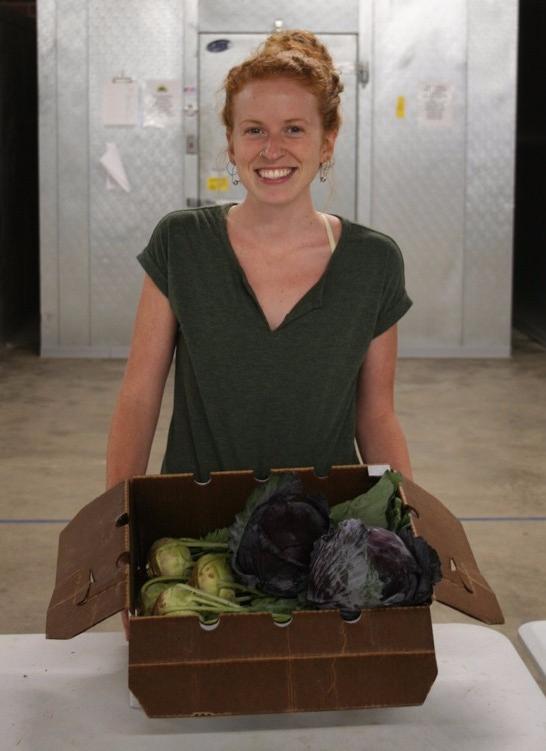 Molly Riddle is a native of Burnsville, NC and currently attends Brevard College, where she is majoring in Environmental Studies with a focus on Sustainable Agriculture. Her interest in agriculture began when she participated in a 4-H program as a senior in high school. She recently started a student group at Brevard College called BC E.A.T.S, which focuses on getting local food into the school's cafeteria.
As part of her work with
TRACTOR Food and Farms this summer, Molly has been updating farmer profiles by conducting interviews with and taking photos of growers who supply the food hub. She says that her favorite part of her apprenticeship has been "[seeing] all their farms... they are literally the best people in the whole world." Molly hopes to farm in the Burnsville area one day and has enjoyed learning about local growers' practices, in addition to understanding the ins-and-outs of running a food hub. "If I am a farmer one day, it will be really nice to understand how a food hub works. And also how hard marketing is for a lot of farmers and how much easier it is to go through something like TRACTOR," says Molly.
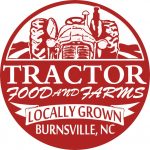
In the short term, Molly hopes to apply her new experience toward furthering the goals of BC E.A.T.S. She has made connections at
FreshPoint
, another of NCGT's mentor organizations and a supplier to Brevard's dining services. Having been impressed by FreshPoint's local food sourcing, Molly says, "Now that I've done this internship I'm less naïve and it'll be easier to have those conversations [about sourcing local foods]."
|
Shannon Herlihy, TRACTOR Food and Farms
|
|
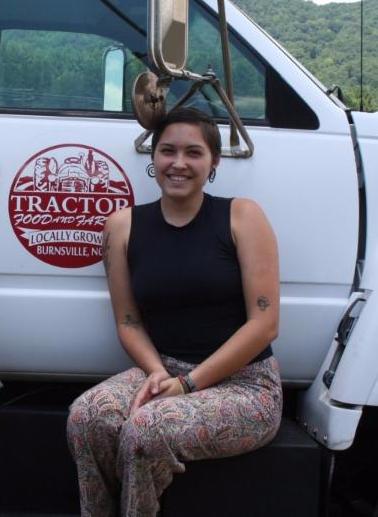 Shannon Herlihy is a rising senior at UNC-Asheville. She is majoring in Environmental Studies, minoring in Health and Wellness, and has designed her own concentration focusing on Food, Land, and Community. Growing up outside of Baltimore, MD, Shannon was not exposed to farms or farmers, but developed an interest in agriculture after attending a magnet arts high school for culinary arts. She hopes to combine her interest in cooking with her interest in environmental protection and the outdoors.
Shannon was excited to apprentice with
TRACTOR Food and Farms because their work relates very closely to her major and to the kind of food systems work she would like to pursue after college. Shannon has enjoyed the site visits and farmer interviews she has worked on, as it has been a unique opportunity to get to know farmers. "I have been really interested in buying local food but besides the farmers market I haven't had any background in knowing farmers," says Shannon.
 Talking to TRACTOR's growers has also broadened her perspective on local foods systems. "I think coming into it I was mostly thinking about local food from an environmentalist standpoint - in terms of less transportation and saving energy" says Shannon. "Now after talking to a bunch of farmers about it, it's made me appreciate local food even more because of how it can stimulate the local economy and support small scale farmers," she adds.
Overall, Shannon is excited to have found the apprenticeship program, noting, "It's hard to find jobs like this - I looked really hard last summer for something related to what I wanted to do and ended up working at a grocery store...I think this is an awesome program, it's great that this is available for people my age."
|
| Ben Herndon, Foster-Caviness |
|
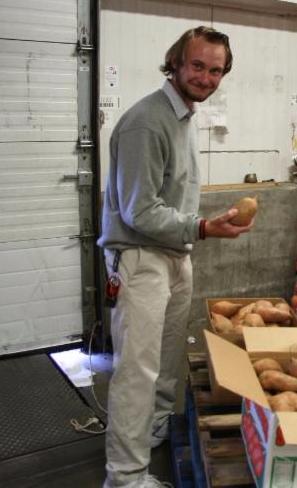 Ben Herndon grew up on his family's farm in Parkton, NC, and worked there until he started college at NC State. He is now a rising junior, majoring in Poultry Science and minoring in Music. He came to the apprenticeship with substantial production experience in raising poultry, sheep, and cows, and also growing rutabaga and watermelon.
Since he had only experienced the production side of the supply chain, he was interested in working with
Foster-Caviness
in order to learn more about produce distribution.
This summer Ben has been helping with customer service, and helping his apprenticeship mentor Jason Kampworth, Local Buyer and Sustainability Coordinator, coordinate a new workplace CSA box program for clients like Bank of America and SAS.
 Ben says he has learned how stressful the produce distribution business is. "The produce distribution system is really strained because you have to cater to customers but also your [own produce] buyers," says Ben. "You deal with farmers who have to deal with weather. Also, dealing with farmers [is challenging sometimes because you ask] when or how much they will have this week and they say 'I don't know', but you need to know," he adds. Ben hopes to own a farm one day and he now has very specific insight into the perspective of intermediaries like Foster-Caviness, whom he may one day be selling to.
|
|
Katelyn Bailey, Small Business and Technology Development Center, UNC Pembroke
|
|
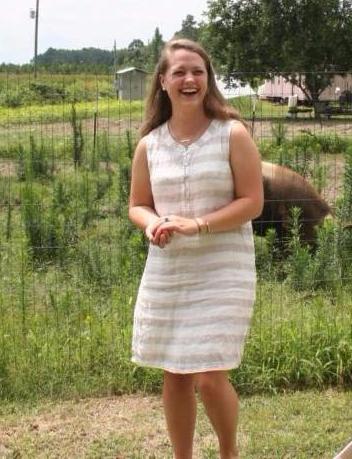 Katelyn Bailey is from Trinity, NC and is currently studying Horticulture at NC State University. Katelyn has brought her knowledge of the agriculture industry to her mentor organization, the
Small Business and Technology Development Center at UNC-Pembroke, which focuses on business counseling services. As an apprentice, she has been helping to develop a business plan for Millard Locklear, a seventh generation farmer, and his wife Connie, who are looking to expand their produce operation. Working with the Locklears has been inspirational for Katelyn, who says it's "really beautiful to see their lifestyle and passion. It's eye opening and makes you think, 'what are the small steps I can make as a person to move toward that?'"
 Katelyn had experience in agricultural research from working in the tobacco lab at NC State, and this apprenticeship has helped her build the skills needed to one day reach her goal of becoming a Cooperative Extension agent. "I'm learning a lot...through working with the Locklears to understand what situation they're in, and to empathize with the farmer" says Katelyn. "I want to go into Extension to be able to connect people with the research... the people who really need it. That's what's so great about the local food movement... It's about getting people involved and letting them know its ok to try new things."
The apprenticeship experience has confirmed Katelyn's desire to work in agriculture and has encouraged her to continue doing what she loves. She explains, "I think the passion I've started inside myself, that Mr. Locklear has empowered in me and that [my mentor Elizabeth Wilkerson, of the Small Business and Technology Development Center] has helped me with... That passion will carry me really far because when you're doing something you love, working hard is never difficult for you. It's amazing to feel that, when you've been struggling in college trying to figure out what you want to do."
|
| Casey Auch, Feast Down East |
|
|
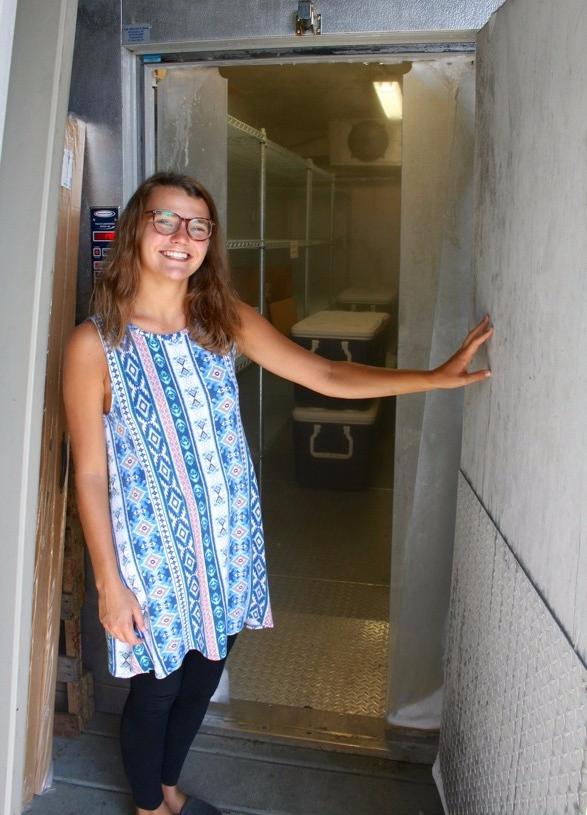 Casey Auch is a rising senior at UNC-Wilmington, studying English and Professional Writing. Early in her college career Casey got involved in environmental activism, and soon turned her attention to local food because it unites her interests in community development and environmental protection.
Last summer she interned with The Lord's Acre, a nonprofit community and education garden, and began doing work with
Feast Down East upon returning to UNC-W last fall. She was grateful to be able to continue working with them this summer to learn about different aspects of the local food supply chain.
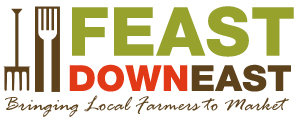 Casey's main project has been interviewing and photographing farmers who supply the Feast Down East food hub, and creating farmer profiles for use in various communications and marketing materials. She has been able to use her writing and design skills to create flyers for prospective farmers, while also helping with daily operations like checking in produce from farmers and packing out twice each week for delivery to restaurants.
"I don't know that I'll ever see my ideal local food system exist but I have to always focus on progress. It's big systematic issues, but you can make a difference in small ways along the chain."
|
| Chase McCurry, Onslow County Cooperative Extension |
|
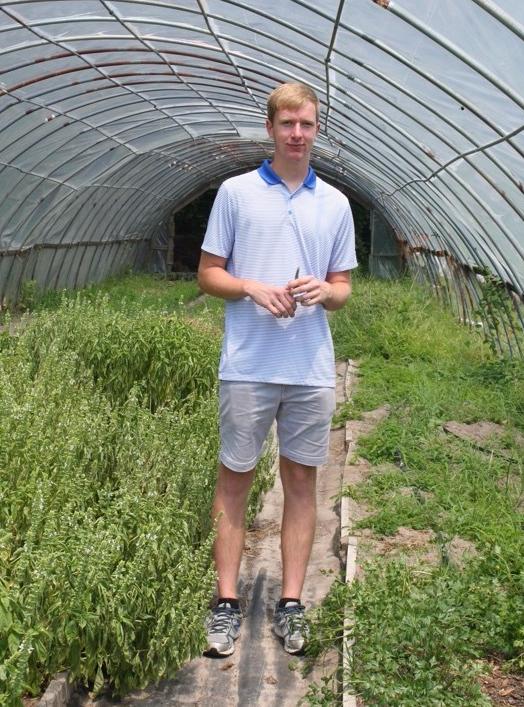 Chase is a rising sophomore at UNC Chapel Hill, studying business. He has lived most of his life in Jacksonville, NC, where both his parents retired from the military after being stationed at Camp Lejeune. He recognizes that most people with military affiliations live their lives moving from place to place, and he feels lucky to have stayed in Jacksonville, where he feels a sense of home and community that perhaps not many do.
"It's a transitional city with the military presence; most people aren't here for long," says Chase. "Most of my military friends have moved away or just got here," he adds. As he learned during his work with the Onslow County Incubator Farm, this poses special challenges to the local food system of Onslow County. "[It's] constant re-education and outreach," he explains, "[it's] one of the reasons local farmers have a hard time selling things, it's hard to get a steady clientele."
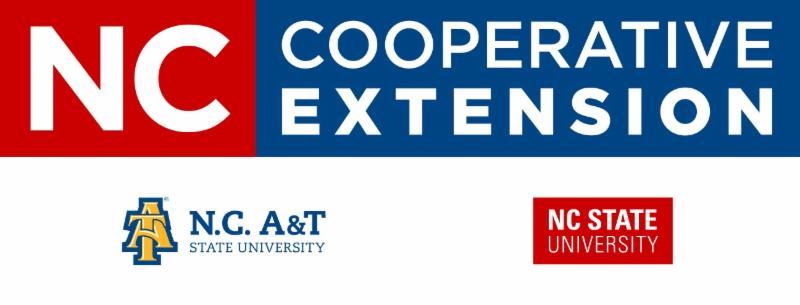 Chase has been working this summer with
Onslow County Cooperative Extension to assess potential remedies for the many food deserts in the County. With his background in business, Chase looks forward to one day returning to Jacksonville to give back to the community and encourage the development of a local food supply chain. "There's not much here than can be considered a community identity. Everyone is from different places here, everyone's looking for something they can call home.... With local foods, one thing they can say is that this came from Jacksonville, NC. That's one of the only things that they can know is from here."
|
Kate Ford, Polk County Agricultural Economic Development Center
|
|

Kate is a rising senior at the University of Virginia in Charlottesville, majoring in Environmental Science and Public Policy. She first became interested in agriculture while doing environmental conservation projects in South America during a gap year between high school and college. While in Ecuador, Peru, and Argentina, she worked on a coffee co-op and a cattle ranch and learned about different conservation and permaculture techniques.
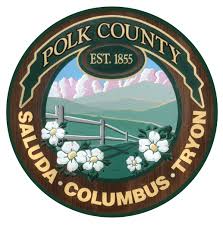 Kate also works on farmers' market promotion, and promoting initiatives to get kids and young adults involved in the markets. Part of Kate's work this summer was to identify funding for a permanent market structure, where Polk County hopes to combine their three existing markets into one.
During her apprenticeship, Kate interacted with many small-scale producers and learned how hard it is for them to get by. "The system is not made for small farmers to thrive," says Kate. "There's a new micro-dairy about to open down the road and the regulations to get certified are the same for them and for a massive dairy operation. For one couple to do all that eats up so much time and resources that they need for other things."
|
| Maria Vollmer, FreshPoint |
|
 Maria Vollmer recently graduated from Virginia Tech with a degree in Environmental Policy and Planning. She is interested in the intersection of food and sustainability, and especially in food waste reduction. She was excited to be placed with
FreshPoint this summer because of her interest in corporate sustainability. Maria is passionate about the difference that can be made by large companies, and says "it's incredible to me how much impact a big company like this can have all the way through having real relationships with small farmers, to being more responsible in their operations."
 During her apprenticeship, Maria has been working on reducing the amount of food waste in FreshPoint's warehouse. Maria was able to complete a baseline assessment of food waste at FreshPoint, which will be a useful comparison point for future waste reduction strategies. She has also made contact with buyers who are interested in purchasing slightly imperfect produce at a discounted rate, and enabled the first sale of overripe strawberries and pineapples to a local ice cream shop.
A major takeaway for Maria is that one person can make a difference, even in a company as large as FreshPoint. "It's important to have in every company that one person who is willing to go that step further and realize that even though doing the right thing is more time consuming and challenging, that it needs to be done," she says.
|
|
|
|
Project Contact Information
Nancy Creamer,
Co-Director of the Center for Environmental Farming Systems, NC State University; and Project Director, NC Growing Together,
nancy_creamer@ncsu.edu
, 919-515-9447
Emily Edmonds, NCGT Extension and Outreach Program Manager, emelders@ncsu.edu, 828-399-0297
Laura Lauffer
, Project Coordinator, Local Farms and Food, North Carolina Agricultural and Technical State University, Cooperative Extension Program,
ldlauffe@ncat.edu
, 336-285-4690
This project is supported by the Agriculture and Food Research Initiative competitive grant no. 2013-68004-20363 of the USDA National Institute of Food and Agriculture.
© 2013-2017 NC Growing Together
www.ncgrowingtogether.org
|
|
|
|
|